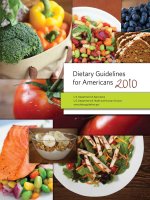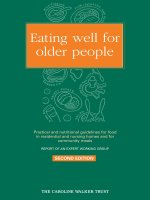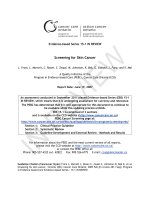Weight Loss for Food Lovers doc
Bạn đang xem bản rút gọn của tài liệu. Xem và tải ngay bản đầy đủ của tài liệu tại đây (1.27 MB, 243 trang )
What Health Professionals have to
say about Dr Blair-West’s work
“After reading Dr Blair-West’s ‘Tantalus’ article on Medscape,
I ‘Googled’ his name. After going to the website, I knew I had to have
the book so I ordered it from an Australian website and simply paid the
international postage. It was well worth it! I thank Dr. Blair-West for his
exceptional work. I’m a psychodynamically-oriented psychotherapist and
have suffered with my weight all my life. This is the rst book that
makes sense to me clinically. I’m so grateful to have found it.
The connection he made to attachment theory is right on!”
– Libby Inman, LPC
Greensboro, NC, USA
“I want to thank you for your book. I received it and
then read it in one day! It was highly informative, reinforcing all
of your workshop ideas and strategies. I have passed it on to
my sister to read next. Thanks again.”
– Michelle Kleiner, Accredited Practising
Dietitian, Sydney, Australia
“George is one of those rare individuals who is so interesting to
listen to, he can hold an audience captive for long periods of time. He is
passionate about his life, his work and his family – this energy radiates from
him, spreading throughout the whole room. Add to this his wicked sense of
humour and everyone leaves his workshops in good spirits
taking with them much valuable, usable information.”
– Rozz Nutting, Psychologist
Brisbane, Australia
Frequently Asked Questions
n Q:WhatkindofdietistheLowSacrice‘Diet’,isitlow
incarbohydrates,lowinfat…?
n A: The Low Sacrice ‘Diet’ (LSD) is not a ‘diet’ in the traditional sense as
it does not prescribe certain foods or menus. It is a psychological
approach designed to minimise self-sabotage. It is low in self-discipline
and low in sacrices because otherwise it cannot be sustained for the
long-term. Losing weight and keeping it off is what this book is all about.
n Q:CanIstilleatmyfavoritefoods?
n A: A key element of the LSD is that not only are your favorite foods allowed,
in fact, they are prescribed. I then teach you ‘Zen and the art of savoring’
strategies so you enjoy your favorite foods more!
n Q:DoIhavetoexercisetoloseweight?
n A: You may be surprised to read that research shows that while it has many
benets, exercise is not a signicant factor in losing weight. Given the
limited effort that people have, I get them to apply it to managing their
energy intake. I prescribe ‘incidental activity’ to assist the process.
n Q:CanIdrinkalcohol?
n A: Yes. I devote a chapter to looking at the complex relationship between
alcohol and weight – complex because alcohol causes less direct weight
gain than people expect, but can, indirectly, cause gain.
n Q:DoIhavetoavoidcertainfoods?
n A: No. It is important that no foods be forbidden.
n Q:Canmywholefamilyadoptthisneweatinglifestyle?
n A: Absolutely. A problem with other diets is that you are often on your own.
Moreover, I believe that a key responsibility for parents is giving our
children healthy ‘obesity-proong’ eating habits (see Chapter 15).
n Q:DoIneedtobuyspecialsupplementsorvitamins?
n A: No – not unless you want to make expensive urine.
Distributed in New Zealand by: Addenda
Printed in Australia by: Grifn Press, Adelaide
Jacket design by: Rhett Nacson
Published by: Alclare Pty Ltd 4b/80 Stamford Rd Indooroopilly Qld 4068
First published 2006
This revised and updated edition published 2008
Copyright © 2006 by George W Blair-West
All rights reserved.
No part of this book may be reproduced or transmitted in any form or by
any means, electronic or mechanical, including photocopying, recording,
or by any information storage and retrieval system, without the written
permission of the publisher, except where permitted by law.
National Library of Australia Cataloguing-in-Publication entry:
Blair-West, George.
Weight loss for food lovers: Understanding the psychology
and sabotage of weight loss.
Includes index.
ISBN 0 9775160 0 8.
1. Weight loss - Psychological aspects. 2. Obesity -
Psychological aspects. I. Title.
613.25
T
o my wife Penny who, in her desire to
avoid public attention, goes otherwise
unrecognized. As a Psychologist, deeply
committed to her craft, her breadth and depth
of knowledge continues to astound me
and is woven through these words.
Your faith in me sustains me.
I am also deeply indebted to my clientele.
As a medical student I was told they would
be my greatest teachers. At the time I did not
begin to appreciate the fullness of the gift
coming my way.
Table of Contents
The Book in Overview i
Navigating this book ii
Why a new approach? iii
Getting Started viii
Introduction ix
Chapter 1 – Party party party 1
What has the medical profession been thinking?! 3
Begin as you wish to continue 4
For the love of food 5
Chapter 2 – Self-discipline it is not 7
Hunting down motivation 8
What if self-discipline does not bring about change? 11
The goal of being fat – Suzie’s story 13
The ultimate motivators 15
Self-discipline cannot compete 18
The power of ‘strategic structures’ 20
Trigger control strategies 22
Chapter 3 – The sleeping dragon of rebellion 23
Ad libitum dieting 24
Building the sensitive new age guy 25
Restraint Theory and the ‘What the Hell’ Effect 27
The Last Supper Effect 28
The Mental Gymnastics Olympics 30
What does it all mean? 31
Chapter 4 – The unholy trinity: deprivation, starvation &
justification 32
The energy mismatch 33
The energy cab rank – alcohol, protein, carbs & fat 34
The King of Sabotage: conning ourselves on a daily basis 37
Chapter 5 – Breakfast like a Princess, lunch like a Queen,
dinner like a Supermodel 38
The French Paradox 39
Depriving ourselves of deprivation 42
Research proves we will cheat anyway 44
Make the most of your forbidden foods 46
Forbidding food, as with sex, makes it more attractive 47
Protein and energy density – Winning the 20-minute battle 48
Chapter 6 – Goal sabotage 51
The False Hope Syndrome 52
The gap between a ‘nice idea’ and execution 57
Chapter 7 – The Low Sacrifice ‘Diet’: We must have our cake
and eat it too 60
Is this food worth dying for? Sorting the foods you love from those
you only flirt with 62
Allowing – The antidote to craving 64
The Model – the before and after shots 66
The role of weight loss drugs 67
Chapter 8 – Mindfulness and Savoring 69
How to live twice as long 70
Speed kills … 74
The natural solution – the third Zen question 74
The mindfulness exercise 77
Savoring – the university course 80
For the chocolate addicts 83
Chapter 9 – The ‘exercise causes weight loss’ myth 85
Exercising to gain weight 86
Does exercise increase metabolic rate? 88
It’s more than you think 89
Exercise overcompensation eating 91
The role of exercise in maintaining weight loss 93
Is there any need for exercise at all? 95
Incidental activity is the answer 96
Taking Longcuts 97
Chapter 10 – The Alcohol Paradox 101
Alcohol and weight – the Alcohol Paradox 103
Disinhibited eating 104
Chapter 11 – Carbohydrate: the ultimate hunter 106
How we are hunted 109
McDonald’s – better at it than Freud 114
Advertising at its best 116
Chapter 12 – Carbohydrates: using GL to sort the good, the bad
& the suicidal 119
Using Glycemic Load to sort our carbs 121
The Low Sacrifice Switching Game 126
How does GL relate to calories and sugar content? 130
Don’t trust your refrigerator 131
True love is helping someone special lose weight 134
Portion size still matters 135
The role of meal replacements 136
You can’t fix a leak if you can’t find it 139
Chapter 13 – Self-sabotage 142
Being in two minds 143
Executing the nice idea – ‘failure fear’ 144
Going through the motions 146
Mindfully observing our excuses 149
Success stress – snatching defeat from the jaws of victory 152
The conscious–unconscious mismatch 155
The success–self-worth mismatch 157
Chapter 14 – Sabotage-proofing through setbacks 160
Making setbacks learning experiences 161
Failure has to be created 162
Chapter 15 – Obesity-proofing our children: a battle of love 167
The gift of indoctrination 168
Are parents making things worse? 169
Food as a language of love 172
Modeling food as a mood elevating drug 174
Love is not a feeling 175
Children are the world’s best accountants 177
The ‘After Rule’ 179
Special time 183
Chapter 16 – The Pleasure Paradox and the pursuit of
happiness 188
The Pleasure Paradox – it is designed not to last 189
Happiness requires challenge 193
Chapter 17 – The weight loss ‘book club’ 196
The power of groups 197
Group guidelines 198
Chapter 18 – The Website 202
Finding a Professional 202
Eating Awareness Diary & Glycemic Load Table 203
Index 217
i
The Book in Overview
The second week of a diet is always easier than the first.
By the second week you're off it.
Jackie Gleason
One of my clients told me the story of how his wife found him eating his
favorite high in sugar, low in food brightly colored cereal for breakfast
only a few weeks into this new eating lifestyle. With some glee she
smugly remarked, ‘So, the all-singing all-dancing new “low sacrifice
eating lifestyle” has already gone the way of all your previous diets!’
Tony (as with all the cases I will describe in this book, his name and
other identifying details have been changed for confidentiality reasons)
responded, ‘This may be hard for you to believe, but this is my new
eating lifestyle. We need to eat certain foods for no other reason than
because we love them. It doesn’t matter if they are less nutritious than
the packet they came in. In fact, Dr George has actually prescribed this
brightly colored cereal of no known nutritional value and told me that if I
don’t eat them I’ll be in trouble. If I were to deprive myself of them, I
would crave them. Once I crave them, I’m on the slippery slope to
rebelling and sabotaging my weight loss. I can show you the prescription
if you don’t believe me.’
His wife was not convinced. ‘You have got to be joking?! What sort
of a diet allows you to eat that rubbish for breakfast??’
‘It’s not actually a diet – there are no foods that I can’t eat if I really
want them. In fact, one of the keys to the psychology of weight loss is
that if you don’t continue to eat your favorite – or what Dr George calls
your “High Sacrifice” – foods your unconscious will ultimately sabotage
the program. You know it makes sense. We both know that in the past I
have deprived myself of foods I love and then ended up bingeing on
them! And, by the way, while we’re at it: I’ve been eating chocolate for
morning tea at work!’
The book in overview
ii
To be fair to Tony’s normally loving and supportive wife, she had
lived through dozens of failed diets that he had tried over the years. She
had, quite understandably, become rather skeptical. She refused to shop
differently for him this time around – unless he proved he would stick to
it – but that time had not yet come. In a particularly scathing tone she
responded, ‘Sounds like psychobabble BS to me. How could you lose
weight eating cereal that is more colorful than the packet it came in!?’
‘Darling, I think that the question you’re asking me should be: “How
have you lost weight eating that rubbish?”’ Tony stood up and with great
pride pointed to the wear mark on his belt. ‘What do you notice?’
Somewhat contrite, his wife said, ‘Two notches! What’s going on?!’
I share Tony’s story with you because it highlights the psychological
issues around weight loss, including some of the issues with partners.
The most important point was that when I asked him how hard he was
finding it and whether he thought he could do it long-term his response
was: ‘Are you kidding me? While I have lost weight more quickly, this
is the easiest weight I have ever lost. I can’t see why I can’t do this
forever!’ And that is my goal: helping people to bring to life a new
eating lifestyle that they can continue for life.
Navigating this book
Gone are the days when people read a book in order,
from cover to cover
– if they ever existed. While this book is loosely sequential – it can be
read by jumping from chapter to chapter. What follows is an overview as
to how the book is laid out to assist those of you who might not wish to
read the book in the traditional way.
Chapter 1 explores our deep attachment to food and how we must
respect this so we do not set ourselves up to fail. It is just not good
enough for doctors and dietitians to tell overweight patients they ‘should
exercise more and eat less fattening food’. I have not met an overweight
person in my clinical practice, or outside it, who did not know this.
As a psychotherapist I have spent two decades helping people to
change, permanently. I could not be more uninterested in short-term
The book in overview
iii
change. Most diets that get a second hearing bring about weight loss –
but for how long? Eventually people give up.
As I started to work with overweight clients I found that they kept
bemoaning their ‘lack of self-discipline’. Many had come to see
themselves as failures. This got me thinking. What actually is self-
discipline and what role does it play in long-term change? The answer?
In simple terms: not much of a role at all. Self-discipline might get us to
study on Sunday and Monday evenings for an exam on Tuesday, but it
simply will not get us to change our eating habits for the rest of our life.
As I will discuss in depth in Chapter 2, self-discipline is of no use
when trying to bring about long-term change. The suprising truth is that
the more you find yourself having to use self-discipline, the more likely
you are to fail. Instead we need to put effort in at the outset to creating
what I call ‘strategic structures’: the building blocks of new habits.
It is critical that you understand this distinction between effort and
self-discipline – whether you are trying to lose weight, give up smoking
or drink less. Effort is critical to success, self-discipline is not. The effort
needs to be applied to planning for danger times because, if we are
perfectly normal human beings, self-discipline will fail us at these times.
Why a new approach?
I was appalled when I started to look at the researc
h into the
effectiveness of traditional diets and found that the medical profession is
better at treating most cancers than we are at treating obesity. In her
informative book, The Psychology of Eating when reviewing the
treatment of weight loss, Joan Odgen said,
‘ in real terms, between
90% and 95% of those who lose weight regain it within several years.’
Some intensive programs have done a little better than this recently
so, to be conservative, I work on a 20% five year success rate as the best
The book in overview
iv
that we can hope for with traditional approaches to weight loss. But what
concerned me much more than these rather bleak figures was research
that looked at how people regained weight they had lost over a period of
five years as summarized in the following table.
1
Year 1 2 3 5
Weight
Regained
45% 52% 68% 115%
What this table (summarizing 20 research trials) tells us is that after
we lose weight, on average, we not only put it all back on over time but
we end up putting on 15% more than we originally lost!
When I had to lose weight because of being overweight and having a
cholesterol problem, I started thinking very carefully about what this
research was telling us. While psychological factors have been
considered before in weight-loss programs – usually under the heading
of ‘behavior modification’ – this component of the program was
typically an add-on and only scratched the surface of the psychological
issues involved. As I looked more deeply into the research, I realized
there was a huge amount of fascinating research that was not being
considered by most workers in the weight-loss field.
When I lecture to doctors, dietitians and other workers in the field I
often ask who has heard of the wealth of research into Restraint Theory
and concepts like the ‘What the Hell effect’. Rarely do more than 5% of
these front line workers raise their hands. Too often none raise their
1
SARIS, WIM H.M. Very-low-calorie diets and sustained weight loss. Obesity
Research. 2001;9:295S–301S.
The book in overview
v
hands. I summarize this neglected field of eye-opening research in
Chapter 3. It explains why it is normal to crash a diet and abnormal to be
able to stick to one long-term.
If around 40% of the population drink coffee, we then consider
drinking coffee ‘normal’. When 80% of the population are unable to
stick to a diet, I think we can comfortably say that this is ‘perfectly
normal’. It is perfectly normal to be unable to stick to a traditional
weight-loss plan. From the outset, traditional weight-loss programs are
doomed as they simply ask too much of normal people. This is why I
argue that rather than people failing diets, diets fail people.
Worse than this, as people try to lose weight and fail, perfectly
normally, they often feel like perfect failures – maybe this has happened
to you? Even more concerningly, many of the people who see me have
failed many times (psychiatrists never being the first port of call for the
overweight!). They don’t just see themselves as failures at weight loss –
they come to see themselves as failures as people. This is tragic when
what has happened is perfectly normal!
The respected Australian nutrition expert, Rosemary Stanton, recently
pointed out that ‘The real problem is that few people follow the
guidelines.’
2
She goes on to quote a long-term study of over 10,000
women where they found that only a third complied with more than half
of the eating guidelines and only two women met all the guidelines!
Research like this got me thinking that we need a big rethink about what
we ask of people. This book is an attempt to do the big rethink.
Also overlooked in designing weight-loss programs, are the teachings
of psychotherapy – this is the end of medicine and psychiatry focused on
helping people to change, permanently. In Chapters 4 and 5, I look at
how these understandings apply to our everyday eating behavior and the
2
Medical Journal of Australia, 2006; 184 (2): 76-79.
The book in overview
vi
games we play to allow ourselves to over-eat. We also look at what the
French have to teach us about eating tasty, rich food. Why the French?
They have one of the lowest rates of obesity and heart disease in the
world.
In Chapter 6 I move down to a deeper layer as I introduce the process
of sabotage and the fascinating ways in which our mind prevents us from
achieving what we want. In Chapters 13 and 14, for those who are
interested, I go deeper again as we explore the unconscious processes
that drive sabotage. These two chapters deal with issues that go way
beyond weight loss and into personal growth more generally. I explore
‘failure fear’ and ‘success stress’ as we look at why we do not
necessarily achieve the objectives that we consciously desire. I explain
how failure only comes into existence when we choose to create it from
what would otherwise be a learning experience.
For those of you who don’t wish to read the book in chapter order,
which is fine, Chapter 7 contains the essence of the Low Sacrifice Diet –
the backbone of this approach. This needs to be combined with Chapter
8, which explains how we keep our ‘high sacrifice’ or forbidden foods in
our diet while limiting them to an unproblematic level. To achieve this I
rely heavily on Zen Buddhism teachings around mindfulness and recent
research into savoring. We eat more because we taste less. So by
learning to taste more, we can happily eat less.
Chapter 9 introduces, somewhat controversially, the complex – and
almost non-existent – relationship between exercise and weight loss.
Exercise has many benefits, especially in terms of cardiovascular health
and stress management, but significant weight loss is just not one of
them. I will explain why managing our dietary intake is at least five
times more powerful than exercise, in losing weight. I will review the
research into how exercise can actually cause weight gain and I explain
why I do not promote ‘designated exercise’ sessions such as attending
gyms. I am in favor of boosting ‘incidental activity’ throughout the day.
Another complex relationship is that between alcohol and weight
loss, particularly in women. I explore these issues in Chapter 10 where
The book in overview
vii
we find that alcohol in moderation does not contribute directly to weight
gain, but its psychological impact can be a problem.
Chapter 11 explores the powerful world of marketing food,
particularly carbohydrates, and how ‘low fat’ diets have created the
obesity epidemic. I explore how the marketing of food cleverly uses
unconscious mechanisms to influence their unwitting audience (us) and
how children are targeted to use their ‘pester power’ to empty their
parents’ wallets so they can fill their stomachs on fattening foods.
Chapter 12 is the closest I come to dietary advice as I explain why
carbohydrates are so problematic. I leave the actual food choice to the
reader to develop while applying the psychological principles of ‘low
sacrifice switching’. Carbohydrates, by far the largest and most diverse
food group, are difficult to make sense of without understanding
glycemic index and glycemic load.
Chapter 15 looks at ‘obesity-proofing’ our children. I am still in two
minds as to whether I agree with the argument that not working
diligently to prevent a child from becoming obese, or actively
contributing to it, is a form of child abuse – but I can empathize with the
argument. Obesity or poor eating habits in childhood, more often than
not, just like other forms of child abuse, destines the child to a life of
emotional distress and physical ill health.
In this chapter I put on my relationship therapist’s hat and I revisit the
definition of true love. I explain the gift of instilling a healthy eating
lifestyle in our children that then become a habit for them as adults.
Chapter 16 attempts to introduce recent research and thinking into
‘happiness’ and deals with the confusion people seem to have that
happiness is found through pleasures like eating. It explains how
pursuing pleasure, like eating yummy food, can actually cause
unhappiness. Happiness in life is found in a different direction.
Chapter 17 discusses the power of support groups and provides
guidelines on how to form and run a support group using the model of a
book club that many people, women in particular, are familiar with.
The book in overview
viii
Chapter 18 gives a brief introduction to the website that supports this
book.
Getting Started
I wrote this book to be read in two halves. The first hundred pages, to the
end of the chapter on exercise, are all you need to read to get started.
Spend some time developing your new healthy eating lifestyle and then
come back and read the second half of the book. This second half deals
with managing the obesity-promoting world we live in, along with the
deeper issues of the mind and how it can sabotage our success.
Finally, you will realize as you read this book that I have to take you
into deeper issues if I am going to help you to lose weight and/or keep
off weight you have lost. Things are not what they seem in the world of
weight loss. On the other hand, this fascinating, wondrous world offers
us insights into not just how to manage our weight, but how to more
successfully take on all sorts of personal challenges in our busy lives.
ix
Introduction
There is no sincerer love than the love of food
.
George Bernard Shaw
Question: Why is it that over 80% of people who lose weight eventually
regain what they lose and often more?
Answer: Because dieting is not about what we eat, it is about why we eat!
Diets typically fail to recognize that food is the world’s most addictive
substance! Craving for food is much more powerful than craving for
nicotine, alcohol and other substances.
George Bernard Shaw put it somewhat differently:
Statistics show that of those who contract
the habit of eating, very few survive.
But unlike every other addictive substance food is critically different
in one way – it is a human need. We must have it to survive. Alcohol,
nicotine and other substances of addiction can be hard enough to give up
or manage – and they are nowhere near as important to us as food is! Is it
really any wonder that dieting has such a high failure rate? As smokers
in the western world have given up over the last couple of decades, over-
eating has really taken off!
When we accept that food is a highly addictive substance and start to
tackle it from this perspective, we begin to take control of it. Ignore its
habit-forming potential and we are powerless to control it.
Very few weight-loss programs fully appreciate the addictive quality
of food and even fewer deal with it – primarily because they simply
don’t know how to. Very few diet program planners are qualified in both
human psychology and human physiology. It is deadly simple and much
easier to tell people what they should eat with the latest and greatest diet.
Introduction
x
Trouble is, this focus on what to eat is largely irrelevant; I don’t think I
have met an overweight person who did not know what they should eat
and what they shouldn’t eat!
Getting people excited – and motivated – about a new diet is easy;
people want to believe in a new quick and easy solution, but this
motivation only works for the short term. The enticement of a quick and
easy solution is the real life version of the story of the drunk looking
under the streetlight for his house keys.
As the story goes, a man out for a late night stroll comes across the
hapless fellow and helps him search. After spending some time helping
the drunk without any sign of the keys, he ventured the question ‘Are
you sure you dropped them around here?’ ‘Oh no’, replied the drunk, ‘I
dropped them over there in the shadows, but it’s too dark to find them
there.’
This book is all about venturing over into the dark to deal with the
rather complicated habit of over-eating, while respecting our deep love
of food. While the solution is not quick, it is very much about making it
easier. What the research shows, over and over again, is that the
enjoyment of food wins out every time if the weight-loss program is too
restrictive. Rather than being about going on ‘a diet’, this book is all
about developing ‘a new eating lifestyle’ for the rest of your life.
The best way to do this is to involve the others with whom you share
your refrigerator so that you create a sub-culture that makes it easier for
everyone in it to eat in way that keeps everyone slim. This is the French
way, which we will repeatedly return to throughout this book.
Perhaps our greatest responsibility, however, is to the next
generation. Rates of obesity in children have doubled. Those of us who
are parents must make it easier for our children to manage their weight
by making healthy eating an automatic lifestyle for them from a young
age. In this way – by the time they are making their own food choices,
healthy eating will be a deeply entrenched habit.
GBW
1
Chapter 1 – Party party party
Begin as you wish to continue.
Bob Spelta, Psychiatrist
I've been on a diet for two weeks
and all I've lost is two weeks.
Totie Fields
After we are born, first we sort out the oxygen problem. Once we work
out how to breathe it in, the very next thing that we look for is food.
From that moment on food plays a deep and meaningful role in our lives.
Every time we get upset during these first few years, chances are we will
have a nipple, fake or real, stuffed into our mouth to soothe us – and
often it will work! Think of the association we build up between feeling
better, or being soothed, and food.
Every major event and celebration involves food – indeed often they
revolve around food. Graduations, weddings, Christmas and Easter –
even funerals are not complete without food. And of course there is the
most important event of the year for every one of us – our birthday.
What would you think of your birthday party if there was no food, no
birthday cake? Think about the key role of the cake – it holds the candles
that, when lit, trigger the singing and hooraying.
As children, when we were given a treat by parents and influential
adults, often it was food, or food was a key part of it. There are few
special activities that don’t involve food. What would a trip to the
movies or a theme park be without popcorn, sweets or soft drink?
These celebrations or special times are when we relax and have fun.
Fun and food become closely connected and live side by side in our
minds. Each celebration cements this relationship further. Some events,
such as graduations, are very important landmarks, so the food now
comes packaged with respect.
Party party party
2
As we get older alcohol is added to the mix, further intensifying the
link between fun and food. With alcohol comes sexual flirtation – as
Shakespeare reminded us, ‘Drink it addeth to the desire, but it taketh
away the performance’. Then we add the excitement of sexual flirtation,
and the pleasure and pride of dressing up – you can see that food is now
keeping some mighty powerful company.
With each celebration, each party, each treat, the connection that we
each have to food is given more depth and more meaning. By the time
we reach adulthood, the association between food and having a party is
irreversibly established deep in our mind.
Food becomes one of the ultimate forms of
reward that we can experience as a human
being. Eating becomes ‘party time’.
For many of us food is absolutely the ultimate form of reward in our
day-to-day lives. More specifically, certain foods come to represent
‘party time’ better than others. Chocolate would be the old faithful in this
regard. Think about the foods that cause you the most problems – your
favorite stack-on-the-weight foods – how many of them are the foods
you typically find at a party? For many people I work with, eating their
favorite or forbidden foods is really an escape from their stressful lives
into their own brief little party.
If you start to think through the last few paragraphs I think you can
see the problem that arises when our doctor tells us, or we tell ourselves,
that we have to stop eating those unhealthy foods and go and exercise
more. Consciously we will think that is a good idea – we all want to be
healthier and lose weight – but deep down in our unconscious, a much
more powerful voice is quietly, but firmly, saying ‘Nice idea, but it ain’t
gonna happen – too many sacrifices in that plan.’ It’s a bit like being told
you’re never going to party or have fun again! For most people who then
start to diet this is the beginning of a quiet rebellion.
Party party party
3
What has the medical profession
been thinking?!
For years the medical profession has told people they would be better off
if they stopped eating unhealthy foods and exercised more. What so
many of my clients tell me is that they need to hear something they don’t
know! As if you didn’t know that you should exercise more and eat
fewer bad foods! What have we doctors been thinking?! When I
practiced general medicine before I started specializing in psychiatry, I
have no doubt I handed out the same idiotic advice.
Now when I work with people either individually or in groups, I
cringe when they tell me about doctors and dietitians who told them they
should stop eating unhealthy food as if this was news to them. We
doctors can be a patronizing bunch. I have never met an overweight
person who didn’t know that they should eat fewer unhealthy foods and
exercise more. I have also never met an overweight individual who did
not know that they should cut back on fat and calories in their diet!
So if we all know what we should do, why don’t we do it? Why don’t
we change our behavior? Research going back more than half a century
repeatedly shows that around 80% of dieters ultimately regained the
weight that they lost and, worse still, they often regained more than they
lost! If this has been your experience you can be reassured that you are
perfectly normal.
When you think about this problem from the perspective of a
psychiatrist, it becomes crystal clear why attempts to lose weight usually
fail – the doctors seem not to appreciate that food is highly addictive.
Some of the telltale signs of addiction are cravings, needing more of
the substance than one did previously and changing plans in order to
gain access to the substance. But unlike other addictive substances, we
grow up, as previously discussed, with food having an ever-increasing
emotional meaning for us throughout our formative years.
Surprisingly, given the sophisticated advancements in other areas, the
medical approach to losing weight has completely failed to deal with our
Party party party
4
deep emotional attachment to food and has not evolved since the practice
of medicine began. Instead of approaching the overweight individual in a
holistic way, the traditional approach has seen us using mind–body
separation at its worst!
Begin as you wish to continue
The medical profession is only just beginning to realize that simply
telling somebody to give up smoking because it is bad for you, is an
exercise in abject futility. I think we’ve realized that you would have to
be living in a cave in the Tundra not to know that smoking is bad for
you. (Mind you, if you lived in a cave in the Tundra with no access to
cigarettes it would not be an issue for you!)
I would argue that giving up unhealthy food is a much more
complicated ask. The big difference is that, unlike nicotine or alcohol,
we need food for our very survival! Moreover, as we have seen already,
we develop a much greater attachment to food in our formative years
than we ever do to nicotine or alcohol (although some teenagers do try to
make up the difference!). Food addiction is the only addiction where we
get hooked before we can walk!
Imagine the problem that a heroin addict would have wandering
through their day with heroin available in lots of different forms
everywhere they went! They would get out of bed, open the fridge door
and there it would be – taunting them. Opening the pantry door – more.
Then they would go out only to be confronted by coffee shops with
beautifully presented syringes, all ready to inject – with a nice clean
needle and a small bow to make it look pretty!
How far would a heroin addict get through the day without using? I
believe that food is the most addictive substance on the planet – way
more addictive than heroin. And we doctors expect you to go through
your day – constantly confronted by this addictive substance that you
need to survive – and only eat as much as you need to survive!
While the medical profession may have set the standard, the greater
diet industry is equally to blame. The vast majority of diet plans out









